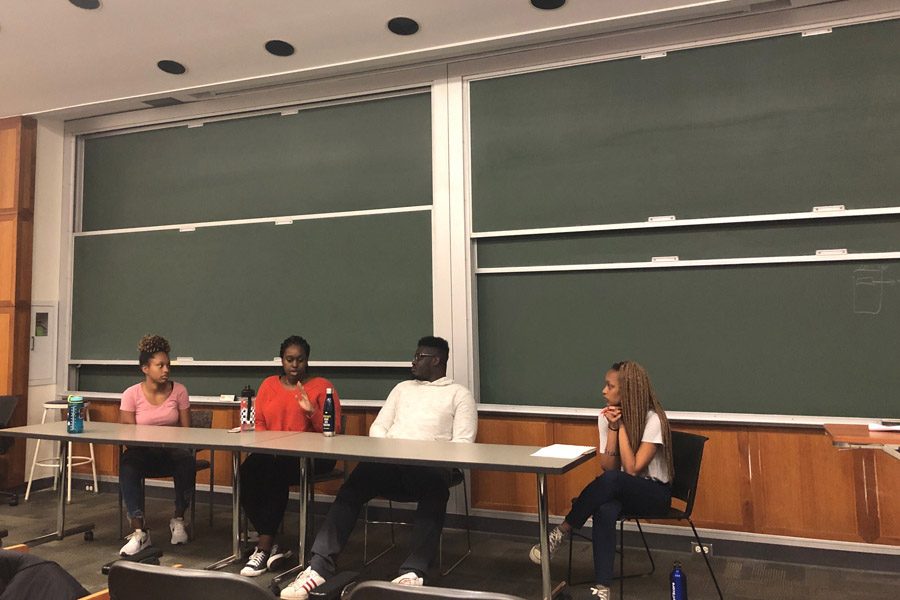Students discuss experiences as black immigrants at discussion panel
Pranav Baskar/Daily Senior Staffer
Students discuss their experiences adjusting to American culture at Monday event.
May 6, 2019
In a Monday panel discussion hosted by Northwestern’s Theta Alpha chapter of Delta Sigma Theta, students shared their experiences navigating American culture as black immigrants.
The panel, titled “LOST: Stories of Diaspora,” was moderated by Medill sophomore Arudi Masinjila, who is from Kenya, and drew a crowd of roughly 20 students. Masinjila kicked off the discussion by asking the panelists how their perceptions of the United States prior to immigrating compared to their real-time experiences after arriving.
McCormick sophomore Claudia Kalisa, who immigrated from Rwanda, said while she felt “lucky” to have the opportunity to study in America, that was only “half the story.”
“The narrative we get is that America is this very developed country, super different from home — and it is in some ways,” Kalisa said. “But I feel like there were things no one told me, like the fact that I’d be treated differently because I’m black.”
Communication senior Fredrick Bugyei, who lived in Denmark, said he resonated with that sort of romantic construction of American culture — something that contrasted with his real experiences. He said his first impression of America was to see it as “dangerous.”
“Growing up, blackness wasn’t the most salient part of my identity,” he said. “But when I came here, It just clicked to me — this is hundreds and hundreds of years. The same structures that existed years ago continue to affect Black Americans today.”
In this vein, the panelists discussed the unique intersections associated with finding identity in America while both being black and an immigrant.
Communication junior Rekhia Adams, who is from Trinidad and Tobago, said part of her experience included trying to find a place in the African-American community without trying to co-opt the experiences of black people who grew up in America.
Adams said that process is complicated by the homogenization of blackness, which is often reproduced by American institutions.
“When checking boxes on applications, for example, there is no box other than ‘black’ that represents me,” Adams said.
Adams said the consequence of this is a compression of the black experience into a single label, despite the very different histories and lives of black individuals around the world.
But despite those differences, students said they were able to find support within the black community on campus.
Kalisi said while “it took some time,” she’s happy with the communities she’s found at Northwestern. She said she “definitely” feels welcomed and included in black spaces on campus.
Bugyei said that living in the U.S. helped him realize the universal experiences that everyone could relate to, which helped him find his footing in American culture. Even though he finds himself learning new things that surprise him every once in a while, he said he found community in black student organizations on campus.
Masinjila closed the discussion by asking the panelists about their plans after college and whether they plan to stay in the United States. All three students were more or less in agreement here: they plan to stay in the country, at least for a little bit.
But for some students, that may come with additional concerns.
Adams said that while she hopes to find a balance between living in America and Trinidad and Tobago, her identity as a black, female immigrant means there are extra questions to answer, and extra hoops to jump through.
Adams said the field she wants to enter, theater, has a shortage of black roles. On top of that, she said, being an immigrant means convincing employers that the extra work necessary to hire her — filing work-visas, for example — is worth it.
“I always feel like I have to prove myself even more,” she said.
Email: [email protected]
Twitter: @pranav_baskar


